The pandemic was a few months old when a two-year-old nonprofit sold municipal bonds to build a $280 million privately owned recreational sports complex on the edge of the Arizona desert.
Yield-starved mutual funds snapped up the tax-exempt debt. Bond payments were slated to come from parking and admission fees, a 670-seat sports bar and tournaments, festivals and after-school programs renting the park’s stadium, fields and courts.
The 320-acre park opened in February in Mesa, Ariz.
After projecting first-year revenue of $125 million, the park brought in $15 million in its first six months and is relying on an emergency cash infusion to pay bondholders. Bond prices have slipped, relations with funds have soured and the Securities and Exchange Commission is asking questions.Douglas Moss, president of the nonprofit Legacy Cares Inc., said that he is unaware of any federal inquiry and that his firm has been upfront with bondholders about risks.
“This is a startup. It’s a big startup, but it’s a startup,” Mr. Moss said. “Everybody’s working together and keeping focused and riding through the rough spots.”
The project, now called Bell Bank Park, offers a window into a little-known corner of the $4 trillion municipal market where upstart firms can sell debt with minimal oversight to finance speculative developments.
Most municipal bond debt is repaid with ultrareliable state and local tax dollars. But private firms, typically nonprofits, can borrow at tax-free rates with the help of government agencies. These so-called conduit issuers sell bonds and then lend the proceeds to the borrower, collecting a fee along the way and bearing no responsibility for repaying the debt.
Over the past five years, as the economy boomed in an era of easy money, conduit issuers financed experimental recycling projects, charter schools, convention-center hotels—and a New Jersey mall and theme park with one of the largest indoor ski hills in the Western Hemisphere.
Mutual-fund managers lined up to buy the debt after tax changes left wealthy households craving munis. High-yield municipal-bond mutual funds held $114 billion as of August, double their assets in 2016, according to Refinitiv Lipper. Even outflows triggered by the March 2020 Covid-19 market crash were short-lived; by that June, money was flowing back in.
Now, bond prices are plummeting, construction and labor costs are soaring and risky deals are faltering. The New Jersey mall and theme park defaulted last month.
The conduit issuer that sold the Bell Bank Park bonds, the Arizona Industrial Development Authority—which collected a fee of more than $1 million—said through a spokesman that it “defers to the lending institution to complete due diligence on the feasibility of repaying the loan.”
The park was a dream of Phoenix-area entrepreneur Randy Miller. Mr. Miller and his son Chad stepped down as directors of Legacy Cares in February 2020. That way, Legacy Sports USA, the for-profit company they run with Randy Miller’s other son Brett, could manage the development and operation of Bell Bank Park without jeopardizing the tax-exempt status of the bonds, according to records and interviews.
Legacy Cares sold a combined $280 million in unrated municipal debt in two deals in August 2020 and June 2021 underwritten by B.C. Ziegler and Co. The bonds offered 30-year yields as high as 7.8%, equivalent to a taxable yield of around 13% for investors in the top tax bracket, according to data from Nuveen LLC.
Mutual funds bought almost all of them, according to data provider FactSet. Investment firm Vanguard Group currently holds $98 million. A video of the park’s ribbon-cutting ceremony shows Chad Miller thanking “Vanguard, our anchor investor, who believed in this vision.”
Little of the debt has changed hands during the recent bond selloff. Some 30-year bonds traded this week at 100 cents on the dollar, down from 114 cents in June, while others traded at 95 cents in August.
Vanguard head of municipal credit research Nathan Will said in a statement that the firm’s “municipal bond fund lineup is broadly diversified with each portfolio comprising thousands of securities.”
For Mesa, a city of half a million, Bell Bank Park was a significant addition, part of the southeastern expansion of the Phoenix metro area. Mesa spent $1.2 million on a section of highway that serves the park and nearby developments. Fitch Ratings cited tourism and employment projections from the park in affirming Mesa’s triple-A rating.
Mr. Moss said supply-chain problems, high labor costs and Covid-19 cancellations delayed completion of the park and its 24 soccer and football fields, 69 volleyball courts, 24 baseball fields and 19 basketball courts. He noted that the USA Gymnastics Development Program held its championships at the park in May.
“We did a demand and market analysis for the project,” Chad Miller said. “There was a significant need.”
Budget documents now anticipate full-year revenue of $48 million, down 60% from the original projection, and rely on an $8 million cash donation to cover a January bond payment. Mr. Moss and Chad Miller said that money may come from Legacy Sports USA.
In the first half of 2022, the park collected $15 million in revenue, bond filings show. Investors peppered management with questions on a June conference call during which a Legacy Sports USA official said the team couldn’t have expected a labor shortage.
“Myself and several other creditors were asking about [labor issues] in January,” Pimco head of the municipal credit research Sean McCarthy said. “Can we stop with the hyperbolic comments about tremendous growth, tremendous interest? Let’s be more specific because these numbers are a bit disappointing.”
City managers in Murfreesboro, Tenn., and McKinney, Texas, where Legacy Sports USA has plans for other sports parks, said they are waiting to see whether the Mesa park makes its coming bond payments before moving forward.
Stephen Griffin, an investor in the business of youth sports and a former certified public accountant who isn’t affiliated with Bell Bank Park, said he contacted the SEC in July because he was concerned about the feasibility of the project and the completeness of the bond disclosures.
Mr. Griffin has since answered questions from the SEC Enforcement Division’s Public Finance Abuse Unit about the park’s revenue projections, feasibility studies and facility-use agreements. He also shared documents with the SEC and registered as a whistleblower, according to interviews with him and emails he provided to The Wall Street Journal.
An SEC spokesman said the agency doesn’t comment on the existence or nonexistence of a possible investigation.
Source: Heather Gillers, Wall Street Journal 9/15/22
https://www.wsj.com/articles/arizona-sports-parks-early-cash-crunch-squeezes-bondholders-11663246488
“NEW” Amateur Sports Added !
We Can Save More Money In 2024 !
26 Different Amateur Sports
Teams, Officials, Tournaments, & Facilities





0 Comments